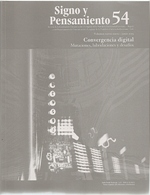Resumo
Os jogos sociais, desde a sua primeira publicação até aos nossos dias, não deixaram de ser referências obrigatórias para todos os interessados em abordar o fenómeno geral do jogo na sua relação com a cultura. Nós não deveríamos ser a exceção e, ainda menos, se levarmos em conta o que significa conhecê-los quando, por várias outras razões, já "aprendemos" a jogar o Second Life e nos matou a curiosidade de entender experiências de jogo típicas de jogos online massivamente multiplayer (a seguir, jmlmj), que já começamos a conceber como o tipo de jogo mais paradigmático.
Chiuppesi, M. (2005), “MMORPG: a review of social studies” (en línea), disponible en: http:// www.serra.unipi.it/dsslab/trimestrale/2005/ mmorpg%20-%20en.pdf, recuperado: 1 de mayo de 2008.
Gil, R.; Tavares, J. P., y Roque, L. (2005), “Architecting Scalability for Massively Multiplayer Online Gaming Experiences”, University of Coimbra.
Huizinga, J. (1998), Homo Ludens, Madrid, Alianza.
Kelman, N. (2008), “La era del videogame” (en línea), disponible en http://archivodocumental.wordpress.com/category/informatica/videojuegos/ recuperado: 21 de abril de 2008.
Klastrup, L. (2003), A Poetics of Virtual Words. Proceedings of the Fifth International Digital Arts and Culture Conference, RMIT, Melbourne. “Multiplayer on Line Game Directory” (en línea), disponible en: http://www.mpogd.com/ games/massively.asp?first=Z, recuperado: 27 de noviembre de 2007.
Murray, J. (1997), Hamlet in the Holodeck, the Future of Narrative in Cyberspace, MIT Press, Cambridge.
Salazar, J. (2005), “On the Ontology of mmorpg Beings: A Theoretical Model for Research. Proceedings of DIGRA 2005”, en Changing Views-Worlds in Play (en línea), disponible en http://www.digra.org, recuperado: 2 de abril de 2008.
Salazar, J. (2004), “Cybontology: The Ontology of the Online Being and the (re)localization of the Notion of the ‘cyborg’”, en II Congreso online del observatorio para la cibersociedad (en línea), disponible en http://www.cibersociedad.net/congres2004/index_es.html, recuperado: 8 de mayo de 2008.
Squire, K. (2002), “Cultural Framing of Computer/Video Games”, Game Studies, vol. 2, Issue 1.
Squire, K., Steinkuehler, C. (2004), Generating Cybercultures; The Case of Star Wars Galaxies. Chapter Submission for Cyberlines: Languages and cultures of the Internet, 2. a ed., Albert Park (Australia), James Nicholas Publisher.
Taylor, T. L. (2004), “The social Design of Virtual Worlds: Constructing the User and Community Through Code”, en: Consalvo M. et al. (eds.), Internet Research Annual, vol. 1, Selected Papers from de Association of Internet Researchers Conferences 2000-2002, Nueva York, Peter Lang.
Esta revista científica está registrada sob a licença Creative Commons Attribution 4.0 International. Portanto, este trabalho pode ser reproduzido, distribuído e comunicado publicamente em formato digital, desde que os nomes dos autores e da Pontificia Universidad Javeriana sejam mencionados. Você pode citar, adaptar, transformar, auto-arquivar, republicar e desenvolver o material, para qualquer finalidade (inclusive comercial), desde que reconheça adequadamente a autoria, forneça um link para o trabalho original e indique se foram feitas alterações. A Pontificia Universidad Javeriana não retém os direitos sobre os trabalhos publicados e o conteúdo é de responsabilidade exclusiva dos autores, que mantêm seus direitos morais, intelectuais, de privacidade e publicidade.


